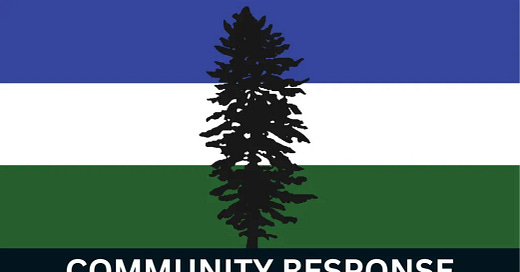Look around you. If you are alive and paying any kind of attention, you notice more wars, more signs of the erosion of global stability, and the devastating impacts of climate breakdown. What is all of this? Professor Jem Bendell’s book ‘Breaking Together’ (free e-book) discusses in detail that “collapse” is an ongoing process that started at least a decade ago, rather than what most people envision… a singular event we are still waiting for. We live in an era of collapse. As Professor Bendell explains, we are witnessing economic, monetary, energy, biosphere, climate, food, and societal collapse. In the second half of the book, he discusses potential responses to this process of collapse.
This essay is an introduction to a guide I will publish as a contribution to that discussion on our response to this ongoing collapse. It will describe the importance of and the process of building Bioregional Community Response Groups (CRGs).
The Vital Role of Locally Empowered Groups
Amidst the devastation of the Russian-Ukraine war, a remarkable story of resilience unfolded far from the front lines. "The Green Road"—a network of ecovillages originally founded to champion sustainability—transformed into lifelines for those fleeing the chaos. As thousands left their homes behind, these ecovillages not only offered shelter but became vibrant centers of refuge and recovery. Leveraging their deep roots in sustainable living and local self-sufficiency, they rapidly adapted to meet the overwhelming needs of displaced communities, offering food, medical care, and a healing community spirit. This powerful transformation underscores the vital role that locally empowered, well-organized groups can play in responding to global crises, setting the stage for the profound impacts that Bioregional Community Response Groups can achieve worldwide.
There are many many other examples. I’ve written about the Kurdish region called Rojava (and their excellent system of conflict resolution), and the Zapatistas, to name a few. There are many potential benefits of organizing groups at the local level. First, let’s talk about what a CRG is.
Definition and Scope of Bioregional Community Response Groups (CRGs)
Definition of CRGs
A Bioregional Community Response Group (CRG) is a locally organized collective aimed at enhancing the resilience, sustainability, and self-sufficiency of a community through the integration of ecological, cultural, and social resources. CRGs are structured around the principles of bioregionalism, which emphasize understanding and managing the natural systems and cultural heritage of a community's specific region. This approach ensures that all initiatives and responses are deeply rooted in the local context, addressing the unique environmental and societal dynamics of the area.
Scope of CRGs
The scope of CRGs encompasses a wide range of activities, all designed to build a robust infrastructure within communities that can withstand and adapt to both chronic stresses and acute shocks. This can and should include coordination with local authorities, and other existing groups. These activities include, but are not limited to:
Emergency Preparedness and Response: Developing plans and protocols to effectively respond to natural disasters, economic crises, public health emergencies, and other unforeseen events.
Security and Safety: Organizing community-based security measures that respect the rights and dignity of all community members.
Resistance Against Exploitation: Protecting community interests against external exploitation. Strengthening community autonomy to resist harmful policies.
Community Engagement and Education: Facilitating workshops and training sessions to spread crucial skills.
Environmental Conservation: Initiatives to protect and restore local biodiversity, and promote the sustainable use of natural resources.
Localism Development: Supporting local efforts, artisans, and farmers to create resilient local production that address our most important human needs independently of global markets.
Health and Wellness: Establishing community health initiatives that can operate independently of centralized medical services, including fitness, mental health support and herbal medicine.
Community Solidarity: Fostering a sense of belonging and mutual care among community members. Strengthening social ties through community events, support networks, and collaborative projects that enhance the social fabric and foster a strong sense of community identity and belonging.
Cultural Preservation: Maintaining and celebrating the cultural practices, languages, and traditions that define the community.
Resource Management: Promote strategies for effective management of food, water, and energy. Encourage equitable distribution and waste reduction.
By covering these diverse areas, CRGs aim not only to manage the immediate needs of their communities but also to plan and prepare for long-term sustainability. The goal is to create a model of living that can be adapted and replicated across various bioregions, contributing to a global network of sustainable, resilient communities. Through their comprehensive approach, CRGs strive to empower local populations, protect the environment, and build a future that aligns closely with the ideals of local-sufficiency and ecological integrity.
Overview of the Guide
As I am writing this, I am building a local group where I live in Cascadia. I may have new thoughts and recommendations from my experience or from others on what should be included. At this point, I plan to cover at least the following:
Part II: What is Bioregionalism and Building Bioregional Identity (Learn More)
How to Start a Bioregional Community Response Group
Content and Activities for Your Group
Structuring Events
Marketing and Recruiting
Governance
Conflict Resolution
Case Studies and Personal Experience
Please consider subscribing to keep up with this vital work. Feel free to comment and provide input on these ideas.






Such a great idea. Think and act locally. Any idea how it could be done in a large city like Toronto?
Community Response Groups (CRGs) sound amazing, and what the world needs right now! Thanks for letting us know about them.